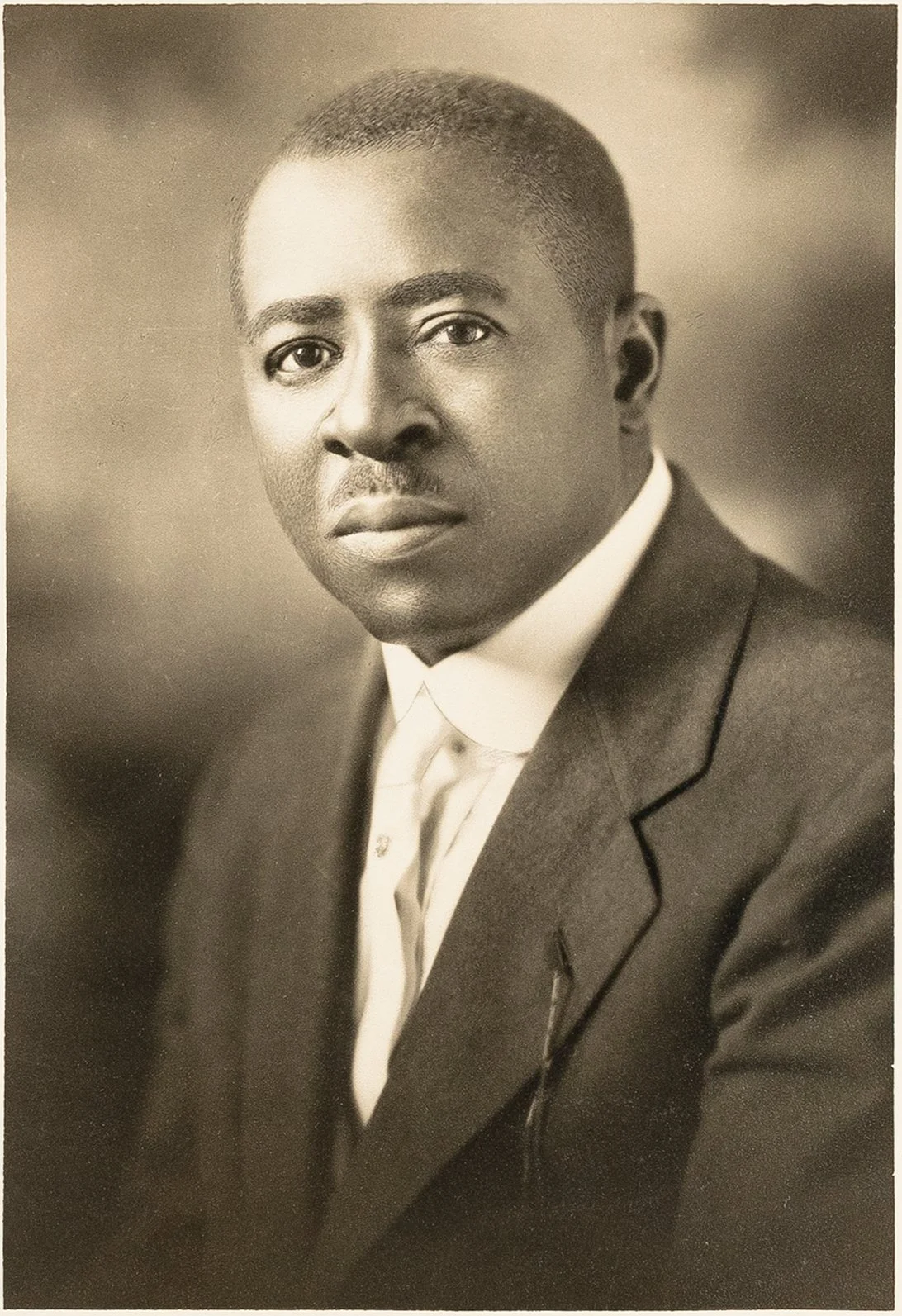
Addison N.
Scurlock
(1883-1964)
Portrait of Robert Sengstacke Abbott
c. 1920s
9-1/2 x 6-1/2 inches (image), full margins
signed in the margin
housed in its original portfolio, embossed S on cover
Abbott (1868-1940), was a lawyer and publisher, and founded the Chicago Defender newspaper in Chicago. He was the great uncle of Chicago photojournalist, Robert Abbott (Bobby) Sengstacke.
Scurlock Studio, Addison N. Scurlock posing a client in Scurlock Studio at 900 U Street NW, c. 1951, gelatin silver print, Scurlock Studio Records, Archives Center, National Museum of American History, Smithsonian Institution
Addison N. Scurlock was one of the most important photographers of the early 20th century, celebrated for his elegant and dignified portrayals of African American life in Washington, D.C. At a time when mainstream media often distorted or ignored Black representation, Scurlock created a vast visual archive that celebrated his community with grace, sophistication, and pride.
Born in Fayetteville, North Carolina, Scurlock moved with his family to Washington, D.C., in 1889. He apprenticed with a white photographer, Moses Rice, and by 1904 had established his own studio, eventually known as The Scurlock Studio, in the heart of the city’s vibrant U Street corridor. His studio quickly became a cultural landmark, drawing the elite of Washington’s Black community during what came to be known as the “Black Renaissance” of the early 20th century.
Over the next five decades, Scurlock documented the lives and achievements of D.C.’s African American citizens—from educators and doctors to artists, civil rights leaders, and everyday families. His portraits exude refinement and poise, reflecting his belief that photography could serve as a tool for social elevation and racial empowerment. Whether photographing luminaries such as Booker T. Washington, W.E.B. Du Bois, and Marian Anderson, or capturing church picnics and Howard University commencements, Scurlock presented his subjects with a sense of inherent dignity rarely afforded to them elsewhere in American visual culture.
The studio’s motto, “Beautiful portraits, as you desire them”, reflected both Scurlock’s technical mastery and his deep sensitivity to his sitters. His use of soft lighting, careful posing, and retouched negatives emphasized a refined image of Black modernity, aligning his work with ideals of self-determination and cultural excellence.
Scurlock’s sons, George and Robert, continued the family legacy after his death, expanding the studio’s reach through the mid-20th century. Together, the Scurlocks created one of the most comprehensive photographic records of Black Washington, documenting civil rights protests, presidential inaugurations, and the evolving fabric of urban life.
Today, Addison N. Scurlock’s photographs are held in major museum collections, including the Smithsonian National Museum of American History, the National Museum of African American History and Culture, and the Library of Congress. His work endures as a testament to photography’s power to affirm identity, preserve community, and reshape the visual narrative of a nation.
Selected Exhibitions
The Historic Photographs of ADDISON N. SCURLOCK, Corcoran Gallery of Art, Washington, DC, 1976
The Evans-Tibbs Collection: Selections from the Permanent Holdings. 19th and 20th Century American Art, Sixth District Police Headquarters, Washington, DC, 1985
A Stronger Soul Within a Finer Frame: Portraying African Americans in the Black Renaissance, University Art Museum, University of Minnesota, Minneapolis, MN, 1990
African American Art: The Paul R. Jones Collection, University of Delaware, Newark, 1993
To Conserve a Legacy: American Art from Historically Black Colleges and Universities, Addison Gallery of American Art, Phillips Exeter Academy, Andover, MD, 1999
Reflections in Black: A History of Black Photographers 1840 to the Present, Museum of Arts and Design, NY, 2000 (organized by Deborah Willis, Smithsonian Institution)
Let Your Motto be Resistance: African American Portraits, National Portrait Gallery, Washington, DC, 2007-08
Picturing the Promise: The SCURLOCK STUDIO and Black Washington, National Museum of African American History and Culture, Washington, DC, 2009
Contemporary Memories: Selections from the Collection of The Amistad Center for Art & Culture, Amistad Foundation, Wadsworth Atheneum, Hartford, CT, 2013
Schomburg Collects WPA Artists 1935-1943, Schomburg Center for Research in Black Culture, NY, 2014
